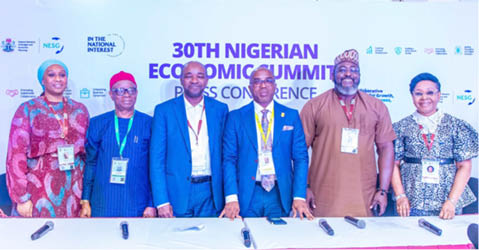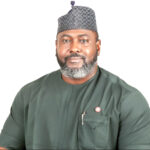The Nigerian Economic Summit Group (NESG) concluded its annual summit, marking a milestone of 30 years in the organization’s history. The event, which brought together business leaders, policymakers, and stakeholders from across Africa and beyond, focused on the theme “Collaboration for Action,” addressing Nigeria’s economic challenges and opportunities.
In a post-summit press conference, the Chairman, board of directors Mr. Niyi Yusuf, reflected on the difficult times Nigeria is facing, emphasizing the importance of resilience and nurturing the opportunities ahead.
“We are going through difficult times, but we need to stay the course and nurture the seeds,” he said, using agricultural metaphors to state the importance of long-term planning.
Yusuf called for patience and persistence, urging stakeholders to “plant, water, and put fertilizer” so that the economy can reap a bountiful harvest in the coming years.
- Bauchi to become hub for investors, commercial activities
- Zelensky rules out ceding territory to Russia
The chairman also acknowledge the availability of private capital within the continent, stressing the importance of partnerships between the private sector, government, and international business communities.
According to him, these partnerships are crucial to realizing the Sustainable Development Goals (SDGs), noting the opportunities presented by the African Continental Free Trade Area (AfCFTA), which expands Nigeria’s potential market from 220 million to 1.4 billion people across Africa.
Yusuf said, “The opportunity is beyond Nigeria; it is the African continent. It’s Africans, whether on the continent or in the diaspora.” With this vision, the NESG is set to drive forward the economic agenda not just for Nigeria but for the entire continent.
Summarizing the activities held during the summit, the NESG Chief executive officer (CEO) Dr. Tayo Aduloju, noted that Francophone African business leaders who joined session expressed eagerness to collaborate more closely with Nigeria, marking a shift toward increasing the landscape of economic growth.
“So they say they want to be part of a summit on an ongoing basis. In fact, they said, we decided to Francophone Africa, let’s talk, because we need Nigerian leadership, not just at home. We need this in the region” he said
The CEO narrated the achievements of NESG over the past 30 years, from telecommunications and seaport reforms to financial services and digital economy advancements.
These reforms, he said, demonstrate that the summit is not just a talk shop, but a platform that drives transformation. He acknowledged that change takes time, citing Nigeria’s telecommunications reform, which took seven years of advocacy.
He said also, the summit resulted in actionable frameworks across five key pillars: building a more secure society, fostering inclusive development, unleashing business dynamics, promoting collaboration, and igniting innovation. In total, 57 sessions were held, each with clear action points to guide Nigeria’s economic future.
One of the key outcomes of the summit was the decision to expand the NESG into a broader African Economic Summit, reflecting Nigeria’s ambition to lead on the continent. This shift aligns with the country’s aspirations under AfCFTA, emphasizing the need for Nigeria to position itself as a hub for regional trade and investment.
The summit addressed the critical issue of fiscal and monetary policy alignment. Aduloju noted that discussions centered on how to move stagnating sectors of the economy into growth through targeted fiscal policies. Also the summit addressed issues of collaboration between fiscal and monetary authorities to foster economic growth and job creation.
In the industrial policy session, Aduloju summarised that participants agreed on the need for regulatory reforms to make Nigeria’s manufacturing sector more competitive, particularly in terms of exports. He described a forthcoming “Industrial Policy Compact” aimed at recalibrating the industrial sector to focus on non-oil exports, which is expected to be launched soon.
Food security and infrastructure were major topics of discussion during the summit. Aduloju said there are need for a systems-based approach to tackling hunger and improving agricultural productivity. He pointed out that Nigeria must move beyond a consumption-driven model to one that builds productive value chains across multiple sectors.
Infrastructure development, particularly in logistics and digital systems, was identified as essential to improving productivity, he noted. The summit advocated for a comprehensive asset fiscalization strategy, aimed at increasing the productivity of Nigeria’s underperforming assets, such as refineries, seaports, and airports.
One of the most resounding messages from the summit was the need for “painful transparency,” as noted by a keynote address during the presidential plenary session. Aduloju explained that transparency is crucial for building trust, especially in times of economic hardship. He called for openness in policy implementation, noting that Nigeria has succeeded before and can do so again if it remains committed to the right reforms.
The summit also called for a stronger collaboration between the government and private sector to ensure that reforms lead to tangible results. As part of this, Aduloju announced plans to publish the summit’s action frameworks, ensuring that the public can hold stakeholders accountable for their commitments.
The CEO noted that the time for dialogue has ended and the time for action has begun. The NESG has committed to tracking the progress of the various action items agreed upon during the summit, with the goal of transforming Nigeria’s economy and positioning it as a leader on the African continent.

 Join Daily Trust WhatsApp Community For Quick Access To News and Happenings Around You.
Join Daily Trust WhatsApp Community For Quick Access To News and Happenings Around You.


